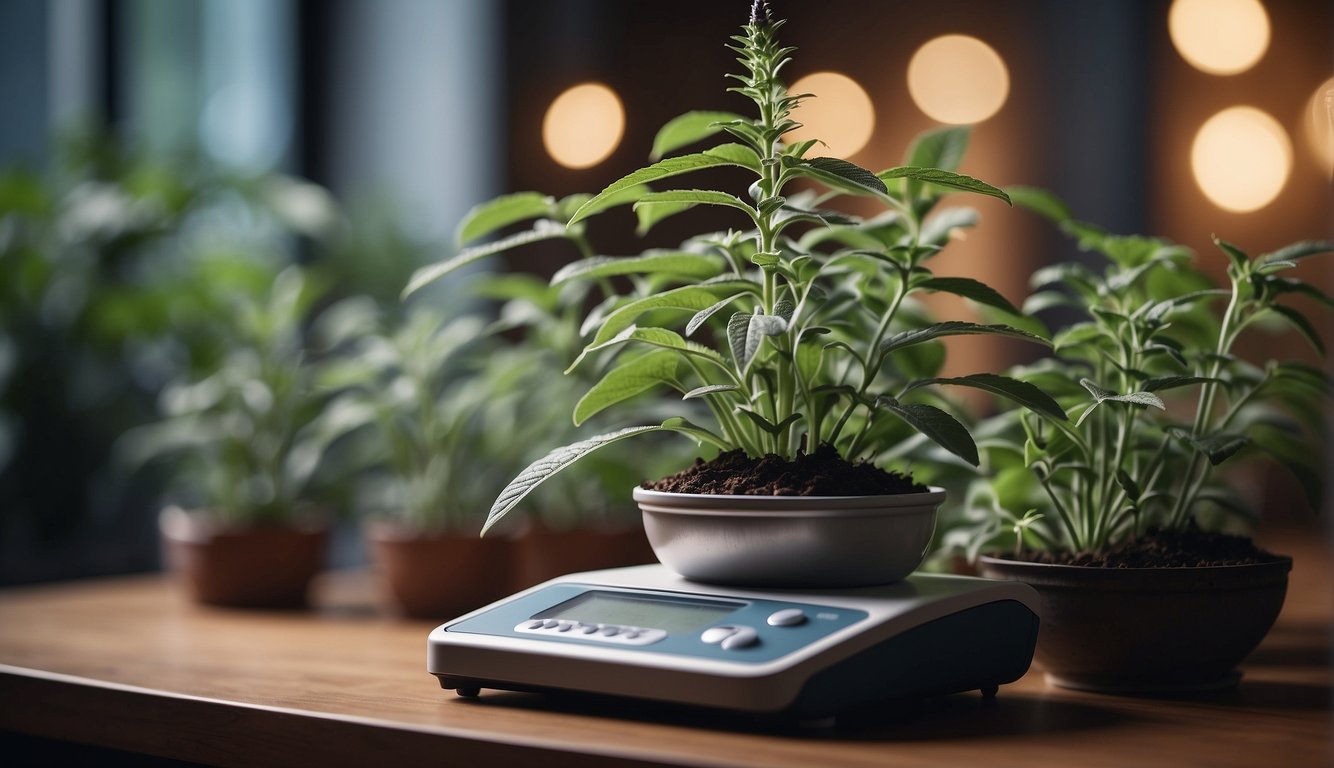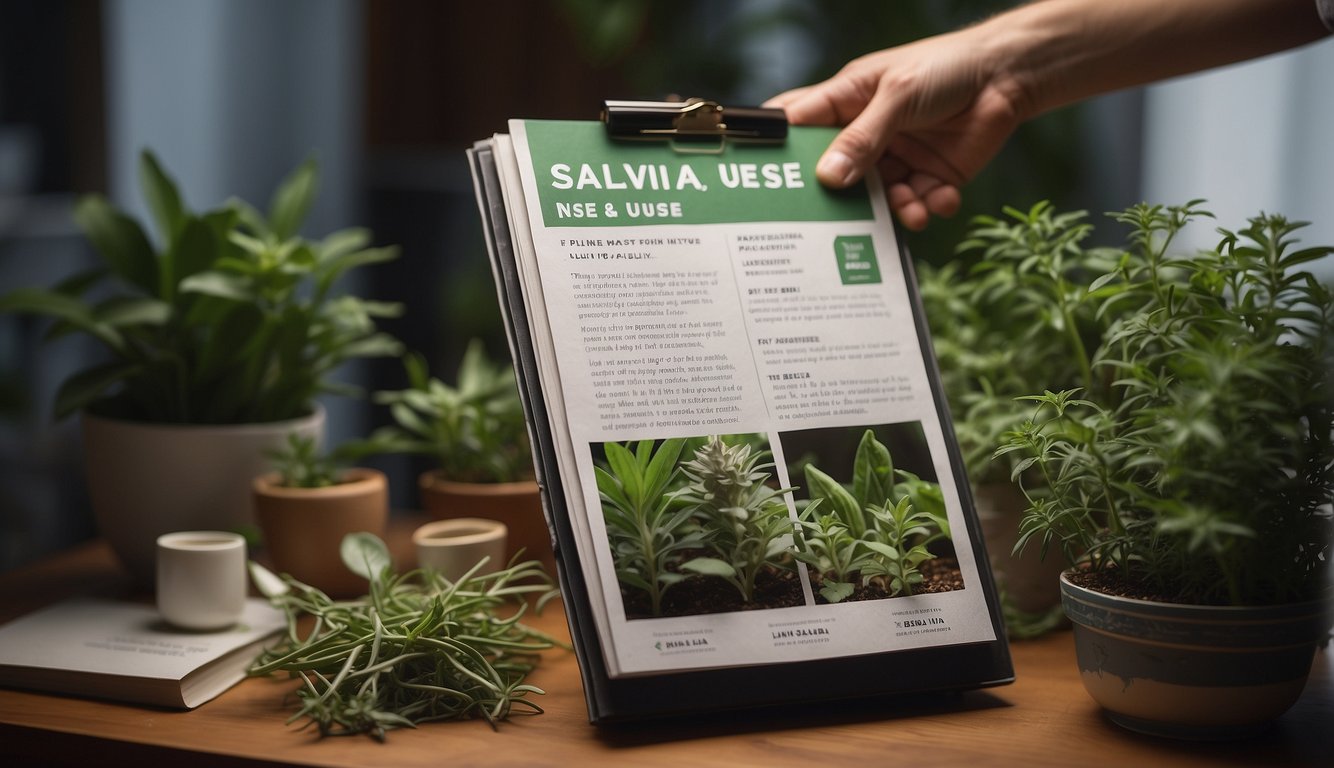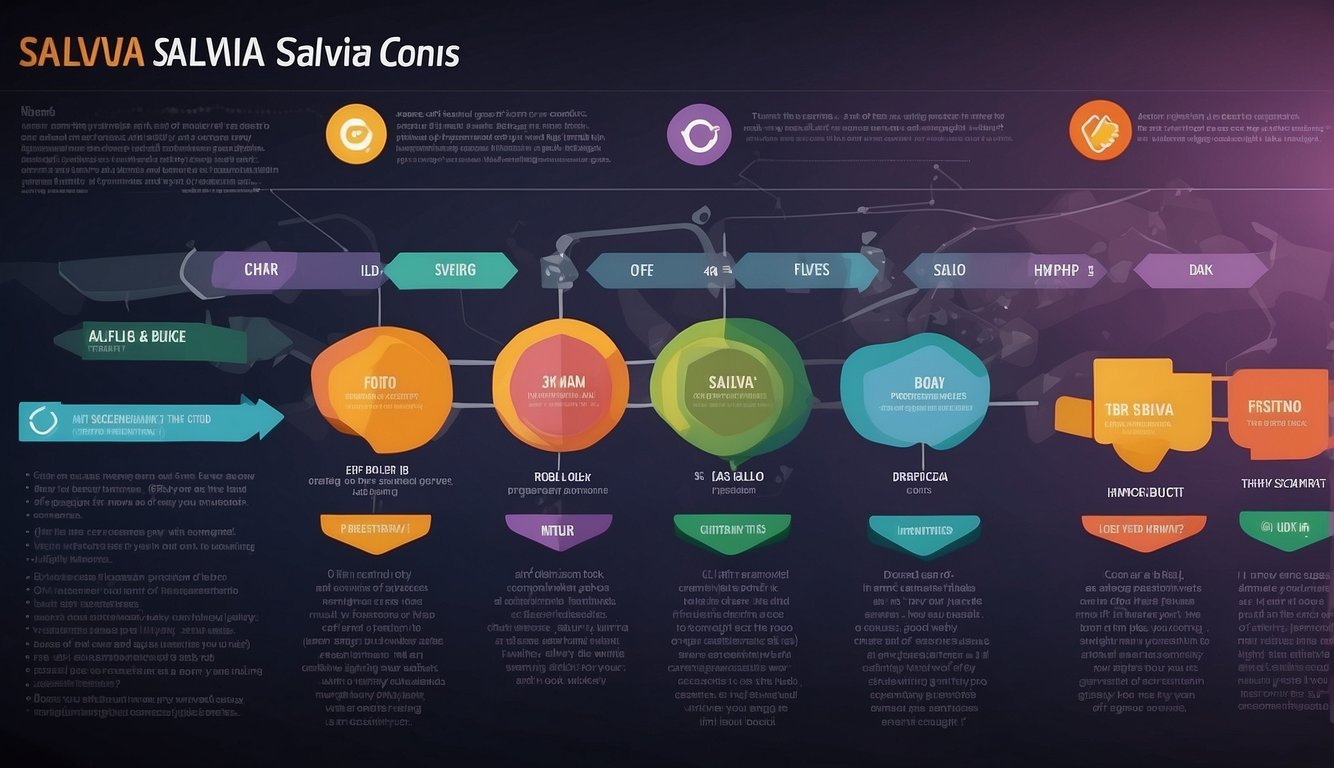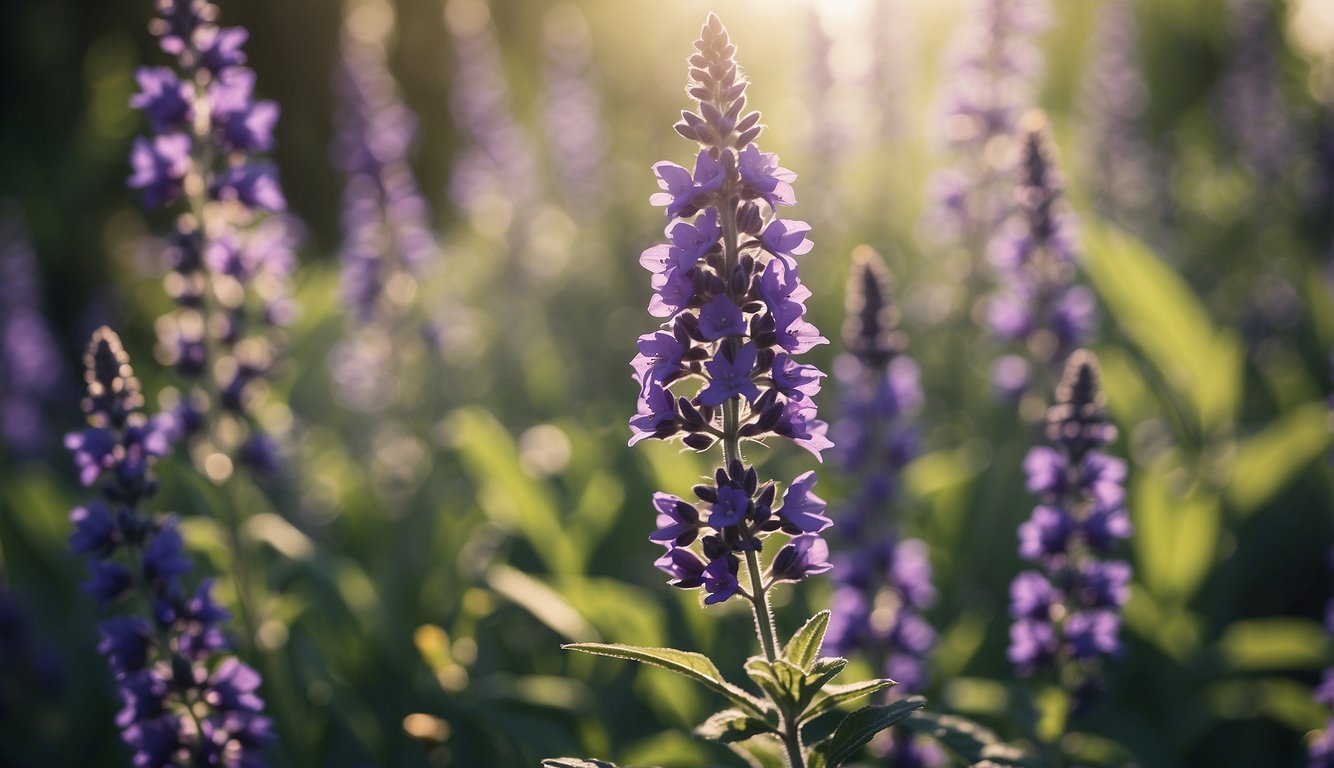TheHerbProf.com is a treasure trove of knowledge for those interested in natural healing and herbal remedies. The website is run by Paul Johnston MD. A naturopathic who has not only received extensive education in the field but also has personal experience in self-healing.
What are the Pros and Cons of Salvia? Salvia divinorum, also known as diviner’s sage, is a plant that is native to southern Mexico. It is a member of the mint family and has been used traditionally by the Mazatec people for its medicinal and healing properties. Salvia is known for its psychoactive effects, and it has gained popularity as a recreational drug in recent years.
As with any psychoactive substance, there are both pros and cons associated with the use of salvia. On the one hand, some people report that salvia has helped them to gain new insights and perspectives, and has even led to spiritual experiences. There is also some evidence to suggest that salvia may have therapeutic potential for certain mental health conditions.
On the other hand, salvia can also be unpredictable and potentially dangerous. The effects of the drug can vary widely depending on the dose, method of administration, and individual factors. Some people have reported experiencing intense and frightening hallucinations, and there have been reports of accidents and injuries associated with salvia use. Additionally, salvia is illegal in many parts of the world, which means that using it can carry legal risks as well.
Understanding Salvia Divinorum

Salvia divinorum, also known as diviner’s sage, is a perennial herb native to Mexico. It contains a psychoactive compound called salvinorin A, which is responsible for its hallucinogenic effects. Salvia is typically consumed by smoking, chewing, or vaporizing the leaves, or by using a tincture or water pipe.
Use and Dosage Guidelines
The effects of salvia can vary depending on the method of consumption and dosage. According to research, smoking salvia can produce effects within seconds and typically lasts for about 30 minutes. Chewing the leaves or using a tincture can produce effects that last longer, up to several hours.
It is important to note that the dosing of salvia is not well-established, and there is no standardized dosing guideline. The potency of salvia can vary depending on the strain and growing conditions, and it can be difficult to determine the appropriate dose. It is recommended to start with a low dose and gradually increase it until the desired effects are achieved.
Effects on the Brain and Body
Salvia can produce a range of effects on the brain and body, including altered perception, mood changes, and an altered state of consciousness. Some users report feeling a sense of panic, anxiety, or stress during the experience. It is important to note that the effects of salvia can be unpredictable and can vary depending on the individual and the dosage.
Salvia divinorum is a powerful psychoactive herb that can produce a range of effects on the brain and body. While it is legal in some states, it is important to use caution when consuming salvia and to follow dosing guidelines carefully.
The Pros of Using Salvia

Salvia, also known as Salvia divinorum, is a natural psychedelic plant that has been used for centuries by the Mazatec Indians of the Sierra Mazateca region of Mexico. As a shamanic and cultural tool, Salvia has been used for divination and spiritual rituals. In this section, I will discuss the pros of using Salvia.
Shamanic and Cultural History – Pros and Cons of Salvia
Salvia has a rich history of use in shamanic and cultural practices. The Mazatec Indians have used Salvia in their spiritual and divination rituals for centuries. Salvia has been used to induce an altered state of consciousness, which allows the user to perceive reality in a different way. This altered state of consciousness can be used for healing, meditation, and therapeutic purposes.
Sensational Feeling of a Salvia Trip
Salvia produces a sensational feeling of a trip that can last from a few minutes to an hour. The effects of Salvia are intense, and the user can experience a range of sensations, including feelings of euphoria, relaxation, and altered perception. The sensation is often described as a “roller coaster ride” or “being on a different planet.” This sensation can be beneficial for those who are looking for a natural psychedelic experience.
Natural Psychedelic Properties – Pros and Cons of Salvia
Salvia contains a powerful psychoactive compound called salvinorin A, which is a kappa opioid receptor agonist. This compound is responsible for the psychedelic effects of Salvia. Unlike other psychedelics, Salvia is non-addictive and has a low potential for abuse. Salvia is also a natural psychedelic, which means that it is not chemically synthesized.
Salvia has a rich history in shamanic and cultural practices and can produce a sensational feeling of a trip. Also, Salvia is a natural psychedelic and contains salvinorin A, which has a low potential for abuse. Salvia can be beneficial for those who are looking for a natural psychedelic experience.
The Cons of Using Salvia – Pros and Cons of Salvia

Salvia divinorum is a potent hallucinogen that can produce intense and unpredictable effects. While some people use it for spiritual or therapeutic purposes, others use it recreationally to experience its mind-altering effects. However, there are several potential risks and adverse effects associated with salvia use.
Possible Side Effects and Risks – Pros and Cons of Salvia
Salvia can cause a range of side effects and risks, including:
- Headaches
- Nausea
- Dizziness
- Loss of coordination
- Anemia
- Bad trip
- Psychotic episodes
- Memory loss
These side effects can be unpredictable and vary depending on the individual, the dose, and the method of ingestion. In some cases, salvia use can lead to long-term mental health problems, such as anxiety, depression, and paranoia.
Implications for Substance Use Disorder Treatment
Salvia use can also have implications for substance use disorder treatment. People who use salvia recreationally may be at risk of developing addiction or other substance use disorders. Additionally, salvia use can interfere with treatment for other substance use disorders, making it difficult for people to achieve and maintain sobriety.
Dangers of Overdose
One of the most significant risks associated with salvia use is the risk of overdose. While salvia is not considered to be as dangerous as other hallucinogens like LSD or psilocybin mushrooms, it can still be harmful in high doses. Overdose can lead to serious health complications, including seizures, respiratory distress, and even death.
While salvia may have some potential benefits, such as spiritual or therapeutic use, it also carries several potential risks and adverse effects. People considering using salvia should be aware of these risks and weigh them carefully before making a decision.
Legal Status of Salvia – Pros and Cons of Salvia

As of February 2024, Salvia divinorum is not illegal at the federal level in the United States. However, several states have passed laws criminalizing its possession, sale, and use. For example, Delaware, Florida, Illinois, Kansas, Mississippi, Missouri, Nebraska, North Dakota, Ohio, Oklahoma, and Virginia have all banned Salvia divinorum.
According to a national survey on drug use and health, the use of Salvia divinorum is relatively low compared to other drugs. In 2018, only 0.1% of people aged 12 or older reported using Salvia divinorum in the past year.
It is important to note that the legal status of Salvia divinorum is subject to change. In the past, there have been attempts to schedule Salvia divinorum at the federal level. For instance, in 2002, Representative Joe Baca proposed legislation to amend the Controlled Substances Act to place Salvia divinorum in Schedule I. The Drug Enforcement Administration (DEA) has also indicated that it is evaluating Salvia divinorum for possible scheduling.
While Salvia divinorum is not currently illegal at the federal level in the United States, its legal status varies by state. It is important to stay informed about changes in the legal status of Salvia divinorum and to comply with all applicable laws and regulations.
Salvia as a Hallucinogen vs. Other Psychedelics – Pros and Cons of Salvia

Salvia is a potent hallucinogen that is often compared to other natural psychedelics such as Kratom, DMT, and Psilocybin. While these substances share some similarities, there are also significant differences that make them unique.
Comparisons with Kratom – Pros and Cons of Salvia
Kratom is a natural substance that is derived from the leaves of the Mitragyna speciosa tree. It is known for its pain-relieving and mood-enhancing effects. Unlike Salvia, Kratom does not produce intense hallucinations. Instead, it provides a mild euphoric effect that can help to alleviate anxiety and depression.
Comparisons with DMT
DMT is another powerful hallucinogen that is often compared to Salvia. Both substances produce intense visual and auditory hallucinations, but the effects of DMT are generally more profound and longer-lasting. Research has shown that DMT can have therapeutic benefits, particularly in the treatment of depression and anxiety.
Comparisons with Psilocybin – Pros and Cons of Salvia
Psilocybin mushrooms, also known as magic mushrooms, are another natural psychedelic that is often compared to Salvia. Like Salvia, Psilocybin mushrooms produce intense hallucinations, but the effects are generally more pleasant and euphoric. Research has shown that Psilocybin can have therapeutic benefits, particularly in the treatment of depression and addiction.
In comparison to other natural psychedelics, Salvia is known for its short-lived and intense effects. While some people may find these effects enjoyable, others may find them overwhelming and unpleasant. It is important to note that Salvia is not recommended for recreational use and should only be used under the guidance of a trained professional.
Overall, the effects of Salvia and other natural psychedelics can vary greatly depending on the individual and the environment in which they are consumed. While these substances can have therapeutic benefits, they should be used with caution and under the guidance of a trained professional.
Guidelines for Safe Salvia Use – Pros and Cons of Salvia

As with any psychoactive substance, it is important to approach salvia use with caution and respect. Here are some guidelines to help ensure a safe and positive experience.
Importance of a Tripsitter
Salvia can be an intense and disorienting experience, so it is highly recommended to have a trusted and sober tripsitter present. A tripsitter can help ensure your physical safety, provide emotional support, and help guide you through the experience. It is important to choose someone who is experienced with salvia or other psychedelics, and who you trust completely.
Why Salvia is not a Party Drug – Pros and Cons of Salvia
Salvia is not a party drug, and should not be used in a social setting or for recreational purposes. The experience can be overwhelming and introspective, and is best approached with a serious and intentional mindset. It is important to set aside time and space for the experience, and to approach it with a sense of reverence and respect.
User Tips for Salvia
Here are some additional tips for safe and positive salvia use:
- Intention and Setting: Before taking salvia, take some time to reflect on your intention for the experience. Choose a comfortable and safe setting, free from distractions and potential sources of stress.
- Mood and Environment: It is important to be in a positive and stable mood before taking salvia, and to create a welcoming and supportive environment. This might include lighting candles, burning incense, or playing calming music.
- Dosing and Onset: Start with a low dose of salvia, and gradually work your way up as you become more familiar with the effects. The onset of the experience can be rapid and intense, so it is important to be prepared and to have a tripsitter present.
- Care and Protection: During the experience, it is important to take care of your physical safety and well-being. This might include lying down, closing your eyes, or wearing eye shades. It is also important to protect yourself from potential sources of harm, such as sharp objects or open flames.
By following these guidelines, you can help ensure a safe and positive salvia experience. Remember to approach the experience with an open mind and a sense of curiosity, and to always prioritize your own safety and well-being.
Before You Go – Pros and Cons of Salvia

Salvia divinorum is a plant that has been traditionally used for its psychoactive properties. While it has been shown to have potential cognitive-enhancing and therapeutic benefits, it also carries some risks and drawbacks.
One of the main advantages of Salvia is its ability to alter human consciousness, leading to visual and auditory hallucinations. This can be a unique and intriguing experience for some people, but it can also be overwhelming and frightening for others. It is important to note that the effects of Salvia are unpredictable, and can vary greatly depending on the person, the dose, and the method of consumption.
On the other hand, some of the disadvantages of Salvia include its legality and availability. Salvia is a controlled substance in many countries, and its use can lead to legal consequences. Additionally, the quality and purity of Salvia products are not always guaranteed, which can lead to unexpected side effects and health risks.
Overall, while Salvia divinorum can be a fascinating and potentially beneficial plant, it is important to approach it with caution and awareness. As with any psychoactive substance, it is important to educate oneself on the risks and benefits, and to use it responsibly and in moderation.
Coffee Grounds Pest Control: A Herbalist’s Secret Weapon
Hello, green thumbs! Today, we’re brewing up some knowledge about coffee grounds pest control. Yes, your morning cup of joe can help keep those pesky pests at bay!
First off, let’s spill the beans on why coffee grounds are great for pest control. They’re a natural deterrent for many pests, including slugs and ants. Plus, they enrich your soil with nutrients. It’s a win-win!
Now, let’s tie this back to theherbprof.com. As your friendly neighborhood Herbalist Blogger, I’m all about sharing tips and tricks to help you grow your best garden. And using coffee grounds for pest control? It’s a perfect example!
By using coffee grounds, you’re not just keeping pests away. You’re also embracing the principles of organic gardening, a topic I’m passionate about and often discuss on my blog, theherbprof.com. You can check our homepage here!
So, why not give it a try? Brew up a pot, enjoy your coffee, and then give those grounds a second life in your garden. Your plants (and your peace of mind) will thank you!
References – Pros and Cons of Salvia
Little Herb Encyclopedia, by Jack Ritchason; N.D., Woodland Publishing Incorporated, 1995
The Ultimate Healing System, Course Manual, Copyright 1985, Don Lepore
Planetary Herbology, Michael Tierra, C.A., N.D., Lotus Press, 1988
Handbook of Medicinal Herbs, by James A. Duke, Pub. CRP Second Edition 2007
The Complete Medicinal Herbal, by Penelope Ody, Published by Dorling Kindersley
Check the Following Articles!
How To Start A Thanksgiving Cactus In Water?
Propagating Succulents: How to Grow New Plants
Coffee Grounds Pest Control: How to Keep It Away Naturally
Frequently Asked Questions – Pros and Cons of Salvia

What are the potential benefits of using Salvia for health purposes?
Salvia has been used for centuries in traditional medicine to treat a variety of ailments, including digestive issues, respiratory problems, and skin conditions. It is believed to have anti-inflammatory, antimicrobial, and antioxidant properties that may help improve overall health and well-being.
Can Salvia be used safely in culinary applications, and are there any risks?
Salvia is commonly used as a culinary herb and is generally considered safe for consumption in moderate amounts. However, excessive consumption may cause adverse effects, such as dizziness, headache, and upset stomach. It is important to use caution when using Salvia in culinary applications and to consult a healthcare professional if you have any concerns.
How can one differentiate between Salvia officinalis and Salvia divinorum?
Salvia officinalis, also known as common sage, is a culinary herb that is commonly used in cooking. Salvia divinorum, on the other hand, is a psychoactive plant that is used for its hallucinogenic properties. The two plants can be differentiated by their appearance: Salvia officinalis has gray-green leaves and purple flowers, while Salvia divinorum has larger, more vibrant green leaves and white or purple flowers.
What are the ideal growing conditions for cultivating Salvia plants?
Salvia plants prefer well-draining soil and full sun, although they can tolerate some shade. They are relatively drought-tolerant and do not require frequent watering. Salvia plants can be propagated from cuttings or seeds and should be pruned regularly to encourage healthy growth.
Are there any known side effects associated with Salvia consumption?
Salvia consumption may cause a range of side effects, including dizziness, confusion, and altered perception of reality. In some cases, it may also cause nausea, vomiting, and headaches. It is important to use Salvia responsibly and to consult a healthcare professional if you experience any adverse effects.
How can Salvia be correctly identified in its natural habitat?
Salvia plants can be identified by their distinctive leaves and flowers. Different varieties of Salvia have different leaf shapes and colors, ranging from gray-green to vibrant green. Salvia flowers are typically tubular in shape and come in a range of colors, including purple, blue, red, pink, coral, and white. It is important to exercise caution when identifying Salvia in the wild, as some species may be toxic or hallucinogenic.


